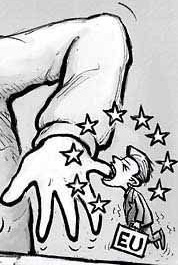Billions in fines show shadowy hands at work
 Anti-trust regulators have fined six big banks A$2.5 billion for their role in rigging international interest rates, with an ongoing investigation to shine a sliver of light on the unknown mechanisms underlying global economies.
Anti-trust regulators have fined six big banks A$2.5 billion for their role in rigging international interest rates, with an ongoing investigation to shine a sliver of light on the unknown mechanisms underlying global economies.
Deutsche Bank will pay just over A$1 billion, the largest of the fines. The Royal Bank of Scotland, JP Morgan, Citigroup, Rabobank and ICAP have been penalised too.
Swiss Bank, UBS and Britain's Barclay bank dodged charges estimated close to A$5 billion, by revealing the existence of secretive cartel at the centre of the racket.
European Union competition commissioner Joaquin Almunia was alarmed at the scale of the money-rigging scam, and says the fines will “punish and dissuade” while investigations continue.
“What is shocking is not only the manipulation of benchmark but [the] cartel,” Mr Almunia said, warning that it was “not the end of the story.”
The big banks were shown to have colluded to fix the benchmark interest rates, such as the London interbank offered rate or LIBOR, in a number of countries. The cartel saw some of the biggest players in the global economy come together to manipulate the rates at which they lent to one another.
The fines are virtually negligible compared to amount of money made for the banks, which the London School of Economics (LSE) has estimated to be around A$180 billion. The LSE will publish the research backing its figure next week.
“To put that into context, the one year's budget of the 24 richest nations for international aid is [A$144 billion],” said LSE professor Roger McCormick.
Some reports claim the rigged rates are tied to around $800 trillion of financial instruments and products such as mortgages and credit cards, suggesting even the most minor modifications could be used to yield vast profits.
Investigations will continue.








 Print
Print